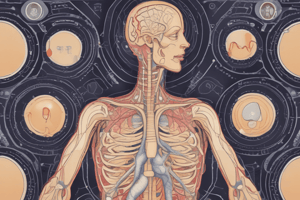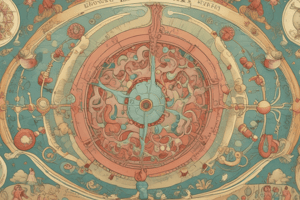Podcast
Questions and Answers
What is the primary function of melatonin produced by the pineal gland?
What is the primary function of melatonin produced by the pineal gland?
- Controls blood sugar levels
- Stimulates growth hormone
- Regulates metabolism
- Modulates sleep patterns (correct)
Which of the following glands produces thyroxine hormones T3 and T4?
Which of the following glands produces thyroxine hormones T3 and T4?
- Pituitary gland
- Thyroid glands (correct)
- Adrenal glands
- Pineal gland
Where is the pineal gland located in relation to the thalamus?
Where is the pineal gland located in relation to the thalamus?
- Caudal to the thalamus
- Ventral to the thalamus
- Dorsal to the thalamus (correct)
- Lateral to the thalamus
Which of the following statements about the hypophysis is true?
Which of the following statements about the hypophysis is true?
Which organ is NOT primarily an endocrine organ?
Which organ is NOT primarily an endocrine organ?
What is a common feature of all endocrine glands?
What is a common feature of all endocrine glands?
Which gland is referred to as the hypophysis?
Which gland is referred to as the hypophysis?
Where is the pineal gland located?
Where is the pineal gland located?
How do hormones released by endocrine glands compare to nerve signals?
How do hormones released by endocrine glands compare to nerve signals?
What is the function of the parathyroid glands?
What is the function of the parathyroid glands?
Which of the following is NOT considered a primary endocrine organ?
Which of the following is NOT considered a primary endocrine organ?
What differentiates endocrine from exocrine glands?
What differentiates endocrine from exocrine glands?
Which of the following organs also function as an endocrine gland?
Which of the following organs also function as an endocrine gland?
What is the primary function of the adenohypophysis?
What is the primary function of the adenohypophysis?
Which structure connects the hypothalamus and the neurohypophysis?
Which structure connects the hypothalamus and the neurohypophysis?
What anatomical feature contains the hypophysis?
What anatomical feature contains the hypophysis?
Which hormone is produced by the neurohypophysis?
Which hormone is produced by the neurohypophysis?
Which part of the pituitary gland is responsible for releasing oxytocin?
Which part of the pituitary gland is responsible for releasing oxytocin?
In relation to the neurohypophysis, where is the adenohypophysis located?
In relation to the neurohypophysis, where is the adenohypophysis located?
Which of the following hormones does the adenohypophysis NOT produce?
Which of the following hormones does the adenohypophysis NOT produce?
How does the hypothalamus communicate with the adenohypophysis?
How does the hypothalamus communicate with the adenohypophysis?
What is a primary function of the adrenal glands?
What is a primary function of the adrenal glands?
Which of the following glands are embedded within the thyroid gland?
Which of the following glands are embedded within the thyroid gland?
What distinguishes exocrine glands from endocrine glands?
What distinguishes exocrine glands from endocrine glands?
What is the role of aldosterone produced by the adrenal glands?
What is the role of aldosterone produced by the adrenal glands?
What gland is located craniomedially to the kidneys?
What gland is located craniomedially to the kidneys?
Which organ combines endocrine and exocrine functions?
Which organ combines endocrine and exocrine functions?
What hormone is typically produced by the adrenal cortex?
What hormone is typically produced by the adrenal cortex?
What type of cells are primarily found in the placenta that provide endocrine functions?
What type of cells are primarily found in the placenta that provide endocrine functions?
Which of the following products are secreted by exocrine glands?
Which of the following products are secreted by exocrine glands?
Which animals typically produce colostrum and milk?
Which animals typically produce colostrum and milk?
How many pairs of mammary glands do dogs usually have?
How many pairs of mammary glands do dogs usually have?
Where do the mammary ridges develop in mammals?
Where do the mammary ridges develop in mammals?
What is the typical number of openings in mammary glands of cats?
What is the typical number of openings in mammary glands of cats?
Which statement is true about mammary glands in dogs?
Which statement is true about mammary glands in dogs?
Which animals have four pairs of mammary glands?
Which animals have four pairs of mammary glands?
What type of connective tissue separates each mammary gland?
What type of connective tissue separates each mammary gland?
Flashcards are hidden until you start studying
Study Notes
Endocrine Organs General Concepts
- Endocrine system functions through hormones, chemical messengers produced by endocrine glands
- Hormones are delivered into the bloodstream, lymph, or tissue fluid
- Endocrine glands lack secretory ducts
- Hormone synthesis is a common function for all endocrine glands
- Endocrine organs collaborate with the nervous system to maintain homeostasis through slow-acting but long-lasting hormone effects
- Primary endocrine organs include:
- Hypophysis (Pituitary gland)
- Pineal gland
- Thyroid glands
- Parathyroid glands
- Adrenal glands
- Organs with combined endocrine activity include:
- Pancreas
- Ovary/Testis
- Placenta
- Endocrine cells in the kidney, brain, liver, thymus, heart, and GI tract
Hypophysis (Pituitary Gland)
- Located in the sella turcica of the basisphenoid bone
- Hypophyseal fossa: depression within the sella turcica where the hypophysis resides
- Composed of adenohypophysis and neurohypophysis
- Adenohypophysis is connected to the hypothalamus through a portal blood system
- Produces:
- Growth hormone
- Thyroid-stimulating hormone
- Adrenocorticotropic hormone
- Follicle-stimulating hormone
- Luteinizing hormone
- Prolactin
- Produces:
- Neurohypophysis is connected to the hypothalamus by a neural stem
- Produces:
- Oxytocin
- Vasopressin
- Produces:
Pineal Gland
- Located in the diencephalon of the brain (caudo-dorsal to the thalamus)
- Produces melatonin, a hormone that regulates sleep patterns
- Resembles a pine cone in shape
Thyroid Glands
- Produce thyroxine hormones T3 & T4
- Usually occurs as a paired gland (right & left lobes)
- Located lateral to the trachea, caudal to the larynx
- May be joined by an isthmus
Parathyroid Glands
- Produce parathyroid hormone
- Typically four glands (2 on each side)
- Embedded within thyroid gland tissue in dogs and cats
- Pale in color compared to the red-brick color of thyroid glands
Adrenal Glands
- Produce critical hormones:
- Cortisol
- Aldosterone
- Epinephrine
- Important in maintaining:
- Muscle, bone, skin, immune system, vascular system
- Central nervous system
- Liver, kidneys
- Behavior
- Located retroperitoneally, craniomedially to the kidney's cranial pole
- Challenging to surgically remove (adrenalectomy)
Exocrine Glands
- Release substances through ducts onto the exterior surfaces of the body or within cavities
- Products include:
- Sweat
- Tears
- Saliva
- Digestive juices
- Milk
Mammary Glands (Mammae)
- Subcutaneous, enlarged sweat glands
- Produce colostrum and milk
- Each gland is separated by a connective tissue septa
- Develop in the mammary ridges (lines) that extend from the axilla to the inguinal region
- Secrete through a teat or papilla
- Dogs:
- Five pairs of mammary glands
- 10-12 openings in each gland
- Cats:
- Four pairs of mammary glands
- 4-8 openings in each gland
- Lymphatic drainage patterns: Axillary & accessory axillary lymph nodes, superficial inguinal lymph nodes, sternal lymph nodes.
Studying That Suits You
Use AI to generate personalized quizzes and flashcards to suit your learning preferences.




